OCR • Psychology
Latest uploads for Psychology at OCR. Looking for Psychology notes at OCR? We have lots of notes, study guides and study notes available for Psychology at OCR.
-
204
- 0
-
23
Courses Psychology at OCR
Notes available for the following courses of Psychology at OCR
-
A2 Unit G542 - Core Studies 2
-
A2 Unit G543 - Options in Applied Psychology 32
-
A2 Unit G544 - Approaches and Research Methods in Psychology H567 17
-
Applied Psychology notes 3
-
AS LEVEL PSYCHOLOGY PAPER 2 1
-
AS Unit G542 - Core Studies H567 81
-
Biological Psychology 1
-
Child psychology 1
-
Cognitive Psychology 1
-
Developmental Psychology 1
-
Exam paper 1
-
GCE AS LEVEL PSYCHOLOGY PSYCHOLOGY 1
-
H567/167 H567 5
-
H567/H167 H567 5
-
Paper 3: Mental health 1
-
Psychological themes through core studies H567 1
-
Psychology 27
-
Psychology H167/02: Psychological themes Psychology 1
-
Research Methods 4
-
Social Psychology 1
-
Statistics 1
-
Themes Through Core Studies H567 9
-
Thursday 16 June 2022 – Morning A Level Psychology 1
-
Unit 1 5
Popular books OCR • Psychology
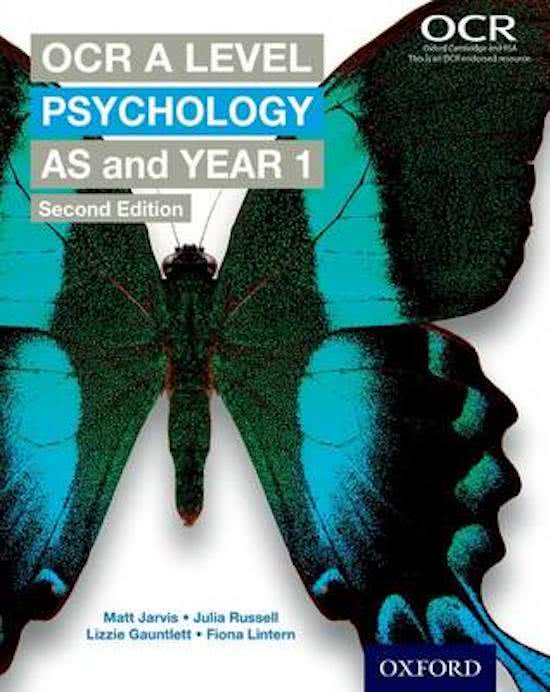
Matt Jarvis, Julia Russell • ISBN 9780198332756
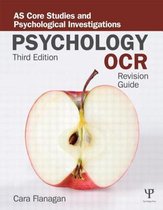
Cara Flanagan, Cara Flanagan • ISBN 9781848721807
Latest notes & summaries OCR • Psychology

A writeup on experiments as part of research methods for OCR Psychology A-Level, including types of experiments, variables, strengths and weaknesses, experimental design and more.
- Summary
- • 12 pages's •
-
OCR•Research Methods
Preview 2 out of 12 pages
A writeup on experiments as part of research methods for OCR Psychology A-Level, including types of experiments, variables, strengths and weaknesses, experimental design and more.

A writeup of correlations for OCR Psychology A-Level, including the types of correlation, strengths and weakness, and more to help with exams and a-level notes.
- Summary
- • 4 pages's •
-
OCR•Research Methods
Preview 1 out of 4 pages
A writeup of correlations for OCR Psychology A-Level, including the types of correlation, strengths and weakness, and more to help with exams and a-level notes.
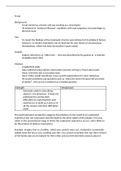
I am providing an in-depth summary of the 1911 study by Sigmund Freud into 'Little Hans' and the oedipus complex. Notes include stages of the oedipus and electra complex, the stages, reasoning and conclusions of the 'Little hans' study and much more you will need to help you master Freud's study.
- Summary
- • 5 pages's •
-
OCR•AS Unit G542 - Core Studies
Preview 2 out of 5 pages
I am providing an in-depth summary of the 1911 study by Sigmund Freud into 'Little Hans' and the oedipus complex. Notes include stages of the oedipus and electra complex, the stages, reasoning and conclusions of the 'Little hans' study and much more you will need to help you master Freud's study.
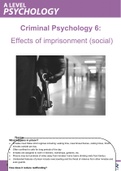
The study of the effects of imprisonment is a complex and multifaceted area of research that involves a range of disciplines, including psychology, sociology, criminology, and law. Researchers in this area aim to understand the impact of imprisonment on individuals, families, communities, and society as a whole.
- Package deal
- Exam (elaborations)
- • 14 pages's •
-
OCR•A2 Unit G543 - Options in Applied Psychology
-
Year 2 Psychology paper 3 practice questions• Byaransingh073
Preview 2 out of 14 pages
The study of the effects of imprisonment is a complex and multifaceted area of research that involves a range of disciplines, including psychology, sociology, criminology, and law. Researchers in this area aim to understand the impact of imprisonment on individuals, families, communities, and society as a whole.
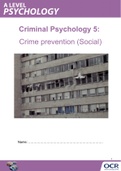
Dealing with offending behavior: This topic covers the various approaches to dealing with criminal behavior, such as punishment, rehabilitation, and restorative justice. Treatment of offenders: Students will learn about the different types of treatment programs available for offenders, such as cognitive-behavioral therapy, anger management, and drug treatment.
- Package deal
- Exam (elaborations)
- • 15 pages's •
-
OCR•A2 Unit G543 - Options in Applied Psychology
-
Year 2 Psychology paper 3 practice questions• Byaransingh073
Preview 2 out of 15 pages
Dealing with offending behavior: This topic covers the various approaches to dealing with criminal behavior, such as punishment, rehabilitation, and restorative justice. Treatment of offenders: Students will learn about the different types of treatment programs available for offenders, such as cognitive-behavioral therapy, anger management, and drug treatment.
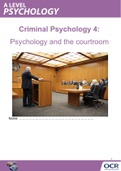
Jury decision making: This topic covers the social and cognitive factors that influence jury decision making, such as group dynamics, decision-making heuristics, and the presentation of evidence.
- Package deal
- Exam (elaborations)
- • 16 pages's •
-
OCR•A2 Unit G543 - Options in Applied Psychology
-
Year 2 Psychology paper 3 practice questions• Byaransingh073
Preview 2 out of 16 pages
Jury decision making: This topic covers the social and cognitive factors that influence jury decision making, such as group dynamics, decision-making heuristics, and the presentation of evidence.
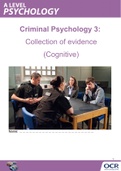
Forensic psychology: This topic covers the application of psychology to the criminal justice system, including the assessment of offenders, psychological profiling, and the role of psychologists in legal proceedings.
- Package deal
- Exam (elaborations)
- • 12 pages's •
-
OCR•A2 Unit G543 - Options in Applied Psychology
-
Year 2 Psychology paper 3 practice questions• Byaransingh073
Preview 2 out of 12 pages
Forensic psychology: This topic covers the application of psychology to the criminal justice system, including the assessment of offenders, psychological profiling, and the role of psychologists in legal proceedings.

The psychodynamic approach is a theoretical perspective in psychology that emphasizes the role of unconscious thoughts and feelings in shaping behavior and personality. The approach was developed by Sigmund Freud and his followers, and it remains influential in contemporary psychology. Freud proposed a model of the mind consisting of three parts: the id, the ego, and the superego. The id is the primitive and instinctual part of the mind, driven by the pleasure principle and seeking immediate ...
- Presentation
- • 12 pages's •
-
OCR•AS Unit G542 - Core Studies
Preview 2 out of 12 pages
The psychodynamic approach is a theoretical perspective in psychology that emphasizes the role of unconscious thoughts and feelings in shaping behavior and personality. The approach was developed by Sigmund Freud and his followers, and it remains influential in contemporary psychology. Freud proposed a model of the mind consisting of three parts: the id, the ego, and the superego. The id is the primitive and instinctual part of the mind, driven by the pleasure principle and seeking immediate ...

First, the presentation delves into Freud's Psychodynamic Theory, which posits that the human psyche is composed of three interconnected parts - the id, ego, and superego - that interact with each other to produce complex behavior patterns. The presentation examines the role of the unconscious in Freud's theory, as well as his ideas about repression, transference, and the Oedipus complex. Next, the presentation turns to Gould's Core Study on Biological Determinism, which argues that evolut...
- Presentation
- • 11 pages's •
-
OCR•AS Unit G542 - Core Studies
Preview 3 out of 11 pages
First, the presentation delves into Freud's Psychodynamic Theory, which posits that the human psyche is composed of three interconnected parts - the id, ego, and superego - that interact with each other to produce complex behavior patterns. The presentation examines the role of the unconscious in Freud's theory, as well as his ideas about repression, transference, and the Oedipus complex. Next, the presentation turns to Gould's Core Study on Biological Determinism, which argues that evolut...
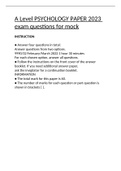
A level Psychology 2023 exam paper practise . These questions will probably come up in exam
- Exam (elaborations)
- • 3 pages's •
-
OCR•Exam paper
Preview 1 out of 3 pages
A level Psychology 2023 exam paper practise . These questions will probably come up in exam
